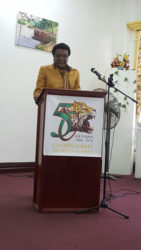Even as proficiency in foreign languages continues to be ever more critical to strengthening external ties that are pivotal to the country’s economic development, there appears to be evidence of a diminished appetite for enhancing such proficiency in local educational institutions, President of the privately-run Language Institute Cicely Bernard has said.
According to Bernard, whilst it continues to be patently obvious that the country’s bilateral and multilateral economic and development fortunes are intricately bound up with enhanced proficiency in foreign languages, “We witness with dismay the demise of foreign language programmes in some of our longstanding educational institutions and depleting numbers of students opting for foreign languages in our schools.
“At the level of our economic development as we seek to provide jobs and increased income for our people and enhanced trade for our nation, the breaking of the language barrier… holds the secret to increased business and trade with our continental and hemispheric neighbours.”

Official acknowledgement of Guyana’s geographic location in a multilingual hemisphere and the reality of the importance of a multilingual capacity has been expressed at official levels though there is a widespread view that not anywhere near enough has been done by the state to realize that objective.
Bernard said the Institute’s records indicate that during the period September 2015 to June 2016, 168 students had enrolled in its foreign and second language academic programmes; 96 of these to study Spanish, 37 to study French, 22 to study Portuguese and 13 to study English. Of these numbers, 32 completed at least one module, 20 completed two modules and 17 completed at least one level. These, she said “are significant numbers” at a time when the country as a whole was experiencing a decline in foreign language programmes.
“This gives us hope that all is not lost,” she said.
And according to Bernard, foreign language proficiency can offer Guyana, among other things, increased business and trade opportunities and global connectivity through wider media coverage as well as “enhanced travel experiences and the ability to communicate with persons from other countries and backgrounds.”
Bernard said that over the past academic year the Institute had sought to position itself “both nationally and globally to advance the realization of our vision for the educational arm of our business of creating a multilingual and culturally literate society where each member of the population would in their lifetime be exposed to at least one foreign language and culture.”
In an earlier interview with this newspaper, Bernard had said that the Institute, which is a member of the Georgetown Chamber of Commerce and Industry (GCCI) was acutely aware of its role in building foreign language capacity in the private sector and was seeking to broaden the private sector’s awareness of the importance foreign language capacity to developing external business ties.
And Bernard disclosed that the Language Institute’s trajectory over the past year has witnessed its entry “into the world of business” where it has been able to form strategic alliances with TelePerformance, an international service provider in customer services, technical support, call centre services, debt collection and social media, among others with contact centres in 65 countries, including Guyana and Action Coach, a leading global business coaching franchise. “We have since applied for and gained membership of the Chamber and through this process expect to form strategic alliances with other local businesses,” Bernard added.









